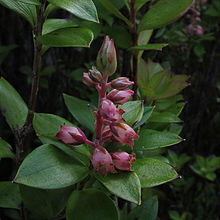| Archeria | |
|---|---|

| |
| Archeria racemosa on Little Barrier Island, New Zealand | |
| Scientific classification | |
| Kingdom: | Plantae |
| Clade: | Tracheophytes |
| Clade: | Angiosperms |
| Clade: | Eudicots |
| Clade: | Asterids |
| Order: | Ericales |
| Family: | Ericaceae |
| Subfamily: | Epacridoideae |
| Tribe: | Archerieae Crayn & Quinn |
| Genus: | Archeria Hook.f. |
Archeria is a small genus of shrubs in the family Ericaceae. As currently circumscribed the group includes six species, all native to southern Australasia. Four of these are endemic to Tasmania, and the other two endemic to New Zealand.
It does not contain any economically important taxa, but due to their attractive small tubular flowers, reticulate leaf venation, and limited distribution, the shrubs have a long history of being admired by Australasian naturalists.
Species
- Archeria comberi Melville (Tasmania)
- Archeria eriocarpa Hook.f. (Tasmania)
- Archeria hirtella (Hook.f.) Hook.f. (Tasmania)
- Archeria racemosa Hook.f. (New Zealand)
- Archeria serpyllifolia Hook.f. (Tasmania)
- Archeria traversii (Hook.f.) Mueller (New Zealand)
Distribution
Archeria can be found scattered throughout south, west, north and central Tasmania, but is largely absent from the east. In New Zealand the distribution is highly disjunct, with A. racemosa being found only in the northern North Island, and A. traversii being scattered locally throughout the South Island and Stewart Island.
Ecology
Like most ericads, Archeria species are largely found on acidic soils. They grow at lowland to montane altitudes, although A. comberi and A. hirtella reach the sub-alpine in parts of their range. Five of the six species are found rather locally throughout shrublands and forests, while A.comberi is found in heaths, sedgelands, and wetlands.
Morphology
Habit The six species of Archeria are all self-supporting shrubs with dark coloured bark. Leaves They have simple, alternately arranged glabrous leaves, with margins that are entire or serrulate. The leaves are unique within the Styphelioideae, being the only genus in the group to have reticulate venation. Inflorescence The flowers are pedicellate, and either in short terminal racemes or solitary and axillary towards the ends of the branches. Flowers and Fruits Flowers are 5-merous, with bracts and bracteoles that are often small and caducous. The ovary is deeply 5-lobed, with the style deeply inserted, nearly to the base. Capsules are loculicidally dehiscent, with many seeds, on basal or sub-basal placentae.
Evolutionary history
Based on morphology, and chloroplastic matK and rbcL DNA sequence data, Archeria is found to be nested within the subfamily Styphelioideae of the Ericaceae. The genus is sister to the rest of the subfamily, except for the tribe Prionoteae, which is sister to the rest of the subfamily and Archeria. It is regarded as distinct enough, both in terms of morphological and molecular data, to warrant monotypic status within its own tribe, the Archerieae.
Etymology
The genus was named by Joseph Dalton Hooker in 1844 after the nineteenth century Tasmanian botanist William Archer.
References
- ^ Crayn, D.M., Quinn, C.J. 1998. Archerieae: a New Tribe in the Epacridaceae. Australian Systematic Botany 11: 23-34.
- Atlas of Living Australia. Archived April 4, 2012, at the Wayback Machine Archeria Hook. f. Searched October, 2011.
- ^ Allan, H.H. 1961. Flora of New Zealand. Volume I: Indigenous Tracheophyta - Psilopsida, Lycopsida, Filicopsida, Gymnospermae, Dicotyledons. Government Printer, Wellington.
- Watson, L. 1962. The taxonomic significance of stomatal distribution and morphology in Epacridaceae. New Phytologist 61: 36-40.
- Kron, K.A., Judd, W.S., Stevens, P.F., Crayn, D.M., Anderberg, A.A., Gadek, P.A., Quinn, C.J., Luteyn, J.L. 2002. Phylogenetic classification of Ericaceae: molecular and morphological evidence. Botanical Review 68: 335-423.
- Eagle, A. 2006. Eagle's Complete Trees and Shrubs of New Zealand. Te Papa Press, Wellington.
External links
- Archeria at The Plant List
- "Archeria". The Encyclopedia of Life.
- Archeria at the Atlas of Living Australia
- Archeria at the Australian Plant Names Index
- Archeria at the UTAS Key to Tasmanian Vascular Plants
- Archeria at the online Flora of New Zealand
- Archeria at the digitised Manual of the New Zealand Flora (1906)